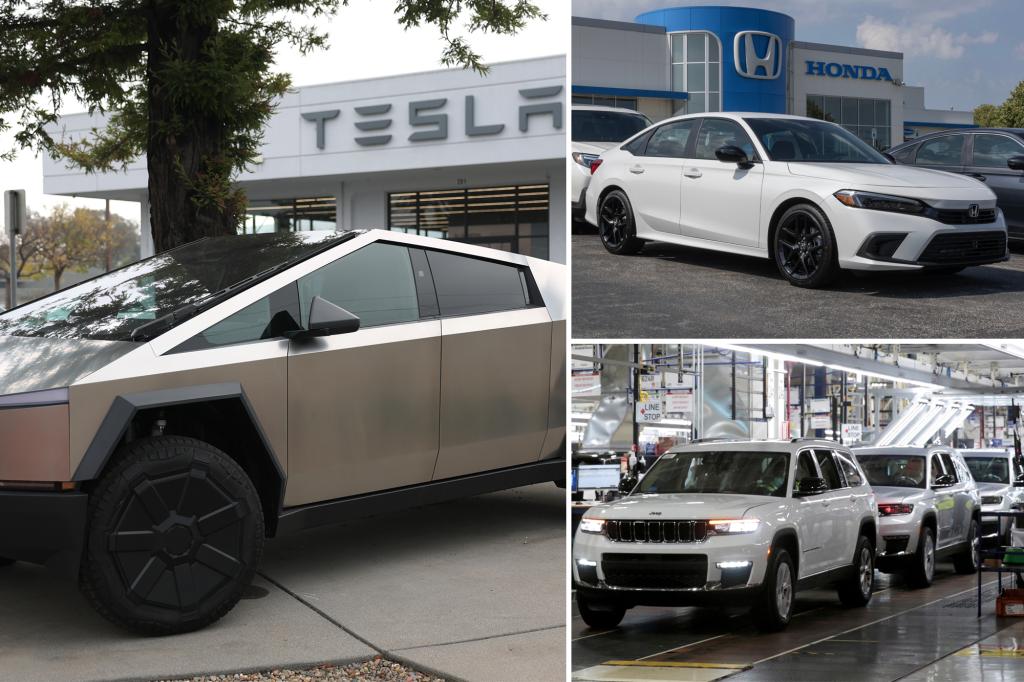In 2024, the automotive industry witnessed a significant number of vehicle recalls, impacting millions of cars and trucks across various manufacturers. These recalls primarily stemmed from safety concerns, underscoring the ongoing vigilance required to ensure driver and passenger well-being. Among the most extensive recalls were those issued by Tesla, Ford, Honda, and FCA US, each involving over a million vehicles and addressing a diverse range of potential hazards.
Tesla led the recalls in terms of sheer volume, issuing two separate recalls impacting over 4 million vehicles combined. The first recall, affecting over 2.19 million vehicles including the Model 3, Model S, Model X, Model Y, and Cybertruck, addressed a non-compliance with federal safety standards regarding the font size of warning lights within the instrument panel. A simple over-the-air software update rectified the issue, enlarging the font size to meet regulations. A second recall of roughly 1.85 million Tesla vehicles focused on a software glitch affecting the hood latch detection system. This issue posed a potential risk of the hood unexpectedly opening while driving, obstructing the driver’s view. Again, an over-the-air software update resolved the problem by enhancing the hood’s open-state detection and providing a user notification.
Ford recalled nearly 1.89 million Explorer SUVs from the 2011-2019 model years due to concerns about the A-pillar trims potentially detaching from the vehicle. This detachment risk stemmed from improperly engaged retention clips, possibly due to assembly or repair issues. While no crashes or injuries were reported, Ford instructed owners to bring their vehicles to dealerships for inspection and potential replacement of the A-pillar trim.
Honda’s recall encompassed approximately 1.69 million vehicles across various models, including the Civic, CR-V, HR-V, Acura Integra, and Acura Integra Type S. The recall stemmed from a potential issue with the steering gearbox worm wheel, which could lead to increased friction and difficulty steering. While the initial complaint surfaced in 2021, no injuries or fatalities were attributed to the defect. Honda advised owners to visit dealerships for a replacement worm gear spring and grease application to mitigate the issue.
FCA US, now part of Stellantis, issued a recall for over 1.03 million vehicles affecting brands like Chrysler, Dodge, Jeep, and Ram. The recall addressed a software issue in the radio system that could potentially disrupt the display of the rearview camera, a crucial safety feature. This malfunction posed a risk of reduced driver visibility and increased crash potential. A free software update rectified the issue, ensuring the proper functioning of the rearview camera display.
These significant recalls underscore the complex interplay of mechanical components, software systems, and safety regulations in modern vehicles. While the automakers promptly addressed the identified issues through software updates, part replacements, or a combination thereof, the sheer scale of the affected vehicle populations highlights the importance of ongoing monitoring and proactive measures to ensure vehicle safety. The ability to deploy over-the-air software updates has become a critical tool for automakers, allowing for swift and widespread resolution of certain issues without requiring physical visits to dealerships. However, issues requiring physical part replacements necessitate a more involved process, requiring owners to schedule appointments and highlighting the crucial role of dealerships in ensuring vehicle safety.
The recalls also demonstrate the evolving nature of automotive technology and the increasing reliance on software within vehicles. As vehicles become more technologically advanced, the potential for software-related issues also grows, necessitating robust testing and validation processes during the development phase. The prompt responses from automakers in addressing these issues through recalls and software updates demonstrate a commitment to safety and customer satisfaction. The collaborative efforts between automakers and regulatory bodies like NHTSA remain vital in ensuring that vehicles meet safety standards and that potential defects are identified and addressed promptly to mitigate risks to drivers and passengers. The recalls serve as a reminder of the ongoing need for vigilance and continuous improvement in the automotive industry, especially as vehicles incorporate increasingly complex technologies.


